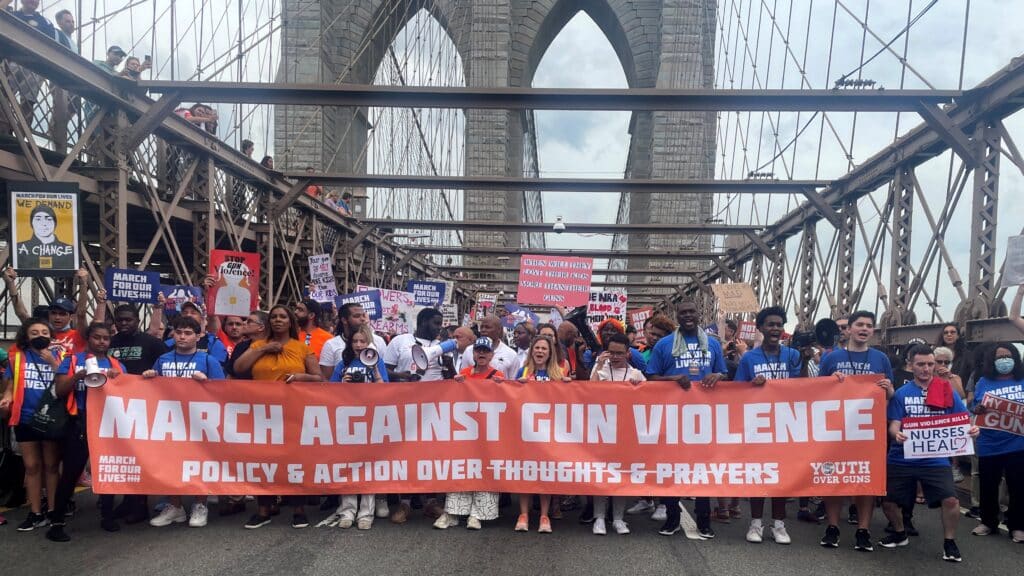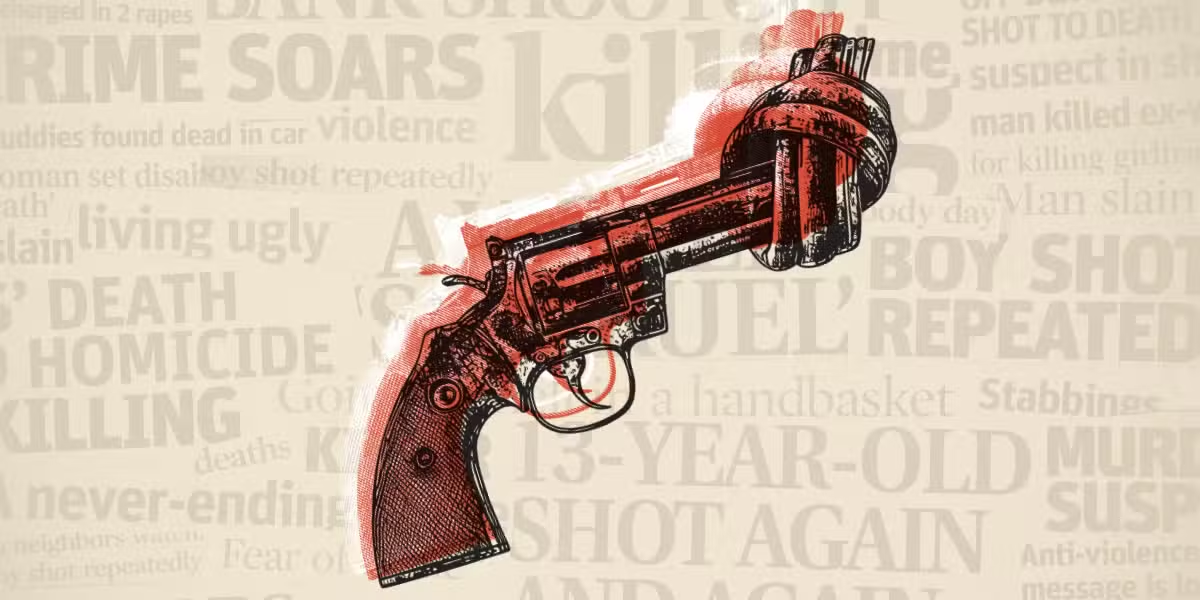Another mass shooting, another spate of thoughts and prayers. A group of sisters and their supporters are working to reignite a sense of urgency in the face of America’s gun violence epidemic.
The prayer service began with a litany of the names of the fallen:
- Damarion Bailey, 15, Homestead, Florida, allegedly shot by his 18-year-old friend for reasons that remain unclear
- Isaac Rodriguez, 15, Milwaukee, allegedly murdered by shooters who rode by via scooter, killing Isaac and a friend who were walking down a city street
- Justin Robinson, 16, Madison, Tennessee, shot during a dispute between two groups of youths at a community center
- and, among 11 in all, infant Andre Lanns III of Deerfield Beach, Florida, a victim of an attempted murder-suicide.
Cobbled together from local news reports, the listing of those young people murdered by gun violence represented the casualties of just another early summer week in America.
But this virtual prayer service featured more than appeals to God to stop the violence. Those praying on a Zoom call were members of Nuns Against Gun Violence (NunsAgainstGunViolence.org). These religious sisters and their friends believe fervently in the power of prayer, but with a caveat that action is needed. The litany served not only as an appeal to the divine but also as a jolting reminder that gun violence is too much a part of American life. For Nuns Against Gun Violence, thoughts and prayers are a beginning, not an end.
From Apathy to Action
The group was formed in 2023 to overcome apathy surrounding gun violence. Members want to galvanize action against guns, particularly in the Catholic community, promoting an urgency about an issue that for too many Americans has become the norm.
While some mass shootings still generate media attention, the steady drumbeat of individual killings largely goes unnoticed. Many involve young people whose lives, such as those in the litany, never had a chance to get started.
The Gun Violence Archive, a nonprofit that tracks incidents of gun violence in the United States, reported 43,069 gun-related deaths in 2023, compared to 47,452 the previous year. The numbers show a decline, but the sisters believe that progress has not been swift enough.
Mass shootings increased from 644 in 2022 to 656 in 2023. In 2024, mass shootings—defined as incidents where four or more people are killed or wounded—continued to number more than one every day.
A Trusted Voice
There is no lack of groups opposed to the epidemic of guns in a country where there are now more firearms than people. But Ursuline Sister Sheila Marie Tobbe of Cleveland says Nuns Against Gun Violence provides a unique perspective.
“Sisters taught us our faith. We trust you,” relays Sister Sheila Marie about the laypeople she hears from, nearly 30,000 via social media and personal contact among alums of the schools sponsored by her community as well as others attracted by the congregation’s advocacy for social justice. Via prayer, letter-writing campaigns to public officials calling for more gun control, and massive billboards—including those in Cleveland and other cities in Ohio—Nuns Against Gun Violence embraces anyone who wants to get involved, whether vowed religious or not.
“We are getting the message out in every way we can,” says Sister Sheila Marie.
Sister Sheila Marie knows the impact of gun violence firsthand. Reflecting on her ministry in El Salvador and urban Cleveland, she can count more than two dozen incidents of people who have died from shootings, most of them youths. They include a top-flight graduate from a Cleveland parochial school, just barely a teenager, murdered in a car, apparently by a drug dealer; Cleveland police officer Derek Wayne Owens, shot in 2008 while pursuing a suspect; and a young man in El Salvador murdered on the streets after returning from that country’s long civil war, an apparent act of vengeance carried out by a warring party unable to accept a truce.
She has seen up close young men in Cleveland and El Salvador brandishing weapons in shows of bravado. Those displays rarely end well and need to stop, she says. “Anyone who cares about human beings needs to fight this issue and get guns under control,” she says.
A Challenge to Catholics
The group’s message is backed by the Church hierarchy. The litany of mass shootings known by shorthand of Parkland (Florida), Sandy Hook (Connecticut) and Las Vegas (Nevada) generated swift calls for gun control from local bishops. And the United States Conference of Catholic Bishops has noted that the right to bear arms should not be an unqualified license for anyone to own guns.
Pope Francis has been direct. In his response to the 2022 killings of 19 schoolchildren and two teachers in Uvalde, Texas, he pleaded, “Enough to the indiscriminate trafficking of guns.” In response to that same tragedy, Cardinal Blase Cupich of Chicago, urging gun control, wrote on Twitter that the constitutional right to bear arms did not come from God on Mount Sinai and should be open to change.
In a letter to Congress a week after the Uvalde shootings, leading US bishops urged action that “addresses all aspects of the crisis, including mental health, the state of families, the valuation of life, the influence of entertainment and gaming industries, bullying, and the availability of firearms.” They called for “the passage of reasonable gun control measures,” echoing the plea of Pope Francis that “it is time to say ‘no more’ to the indiscriminate trafficking of weapons.”
While the Church’s position is clear, Nuns Against Gun Violence remains frustrated that so many Catholics either oppose gun control measures or are content to stay on the sidelines, offering prayers and thoughts after each tragedy.
One goal of the group is to spotlight the issue in parishes and Catholic institutions. Homilies, publications, and calls for action on gun violence need to become a part of Catholic life, says the group.

“When was the last time you heard a homily on gun violence?” says Angela Howard-McParland, a laywoman and a social justice advocate for the Sisters of Mercy and a founding member of Nuns Against Gun Violence. She says that relatively few churchgoing Catholics hear much in their parishes about what Nuns Against Gun Violence considers a primary pro-life issue. Too few Catholics, she says, connect their faith commitment to the cause of what she calls “common sense, evidence-based” controls on guns.
Franciscan Sister Maria Orlandini works in Washington, DC, with the Franciscan Action Network, a Catholic social justice advocacy group. She is an original member of Nuns Against Gun Violence and part of the group’s steering committee.
Sisters, she says, can provide a missing voice in the debate: “Our Catholic Church needs to talk more about it. We are trying to give it a bigger voice. A faith voice in our world is needed.”
Advocating for Common Sense Gun Control
Formed during the 2023 national Leadership Conference of Women Religious meeting in St. Louis, the group began with about 40 congregations of religious communities. That number has increased to 60. The goal is to unify and multiply advocacy among sisters of various congregations.
While enthusiasm to curb gun violence is high among sisters, politically the issue regularly runs into dead ends, both in Congress and in statehouses. The United States is one of few nations in the world to have written the right to bear arms into its Constitution. Gun ownership is a part of the national DNA. And groups such as the National Rifle Association continue to flex their muscle in opposing curbs, organizing gun owners to vote against political leaders who support gun controls, and providing campaign funds for its supporters.
While the issue generates controversy, there is widespread consensus on measures that could help, even if they sometimes run afoul of pro-gun rights groups. Nuns Against Gun Violence is advocating for legislation that would address issues such as:
• Suicide, with shootings as the number one cause of death. Proponents of curbs on guns argue that guns are a reason so many suicide attempts are successful, with those who use them succeeding 90 percent of the time in killing themselves, far more than any other method. According to the Centers for Disease Control, six out of every 10 gun-related deaths are suicides. The sisters view gun violence as a public health issue.
• Curtailing deaths of young people. Gun violence is now the number one cause of death among youths under 18, surpassing disease or car accidents.
• Gun security. Ethan’s Law, now languishing in Congress, would mandate that gun owners safely secure their weapons in a bid to lower the rate of accidental shootings. Millions of American children are raised in homes with firearms.
• Red flag laws, which prevent those with mental health or criminal records from owning guns. Groups such as Nuns Against Gun Violence want to increase their breadth, making sure that those with serious mental health issues are denied guns.
• Placing more restrictions on exports of guns. While much attention is placed on guns that come north from Mexico into the United States, Nuns Against Gun Violence notes that the traffic is actually heavier in the other direction. Weaponry produced in the United States fuels much of the gang and drug wars in Latin America and the Caribbean, they say. The sisters support a lawsuit by the Mexican government against American gun manufacturers. Some congregations are part of an effort to invest in gun companies such as Smith & Wesson and present shareholder resolutions that question their policies.
The investing sisters’ groups regularly push Smith & Wesson to stop marketing guns to children via video games and to change production methods to make guns harder to modify, which can make them even more deadly and rapid-fire.
These efforts are relatively piecemeal. Still it remains difficult to enact many of these measures, in statehouses as well as Congress. More ambitious plans have generated even greater opposition. Perhaps the most important gun control issue is a proposed ban on automatic weapons, which was in place for 10 years beginning in 1994 until Congress let it lapse.
Proponents of gun control blame the lapse of what was called the Brady Bill—named for James Brady, the late press secretary for Ronald Reagan, shot in the assassination attempt on the president—as a prime reason why mass shootings continue to afflict America. They say that weapons of war are used to kill scores of innocent people, including schoolchildren, concertgoers, and office workers. During the time of the assault weapons ban, mass shootings went down but have increased markedly since.
Fasting and Prayer
While advocacy remains a focus, the sisters say that spirituality plays a key role in their efforts. The group sponsors anti-gun Lenten programs focusing on fasting and prayer. Other times of the year the sisters promote campaigns to wear orange, a symbol of the anti-gun movement. Fasting against gun violence is a spiritual practice promoted by the sisters, who would like to see it become a part of American parish life.
Nuns Against Gun Violence says that in fasting, those who participate are offering “a small sacrifice in solidarity with all those suffering from gun violence.” Last Lent, members began their fast on Ash Wednesday with a noon online prayer, Scripture reading, silence, and a reflection, a practice they will continue.
Fasting is “a public prayer that purifies not only the one fasting but the entire community, preparing us to stand our ground against the powers and principalities,” the group noted in a 2024 press release. Whether via prayer, social action, or both, the sisters remain committed to overcoming the apathy and indifference about what they see as a clear and present danger in our midst. In its appeal for their Lenten fast against killings, Nuns Against Gun Violence asks those participating to do more than pray. “The loss of life and continuous toll of grief and trauma on individuals, families, and communities compel us to take action to change our society to protect life,” the group noted.
By combining prayer with action, Nuns Against Gun Violence’s hope is that, one day, prayers will no longer be needed to mark the deaths of youths and that the listing of victims in any routine week in America will be empty. The sisters have a long way to go.








